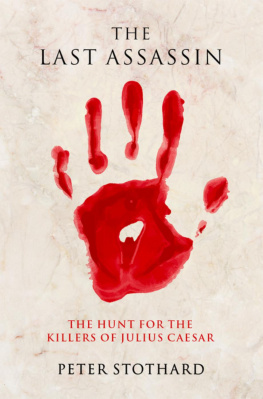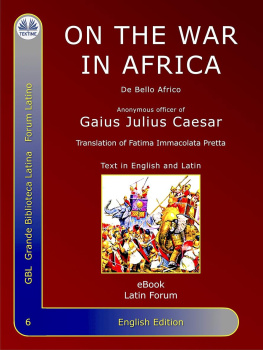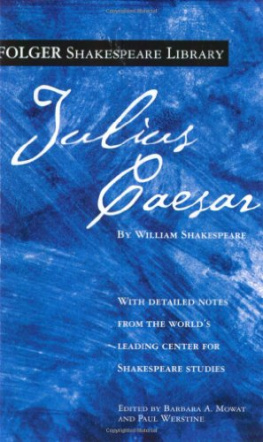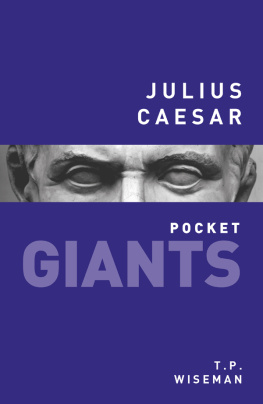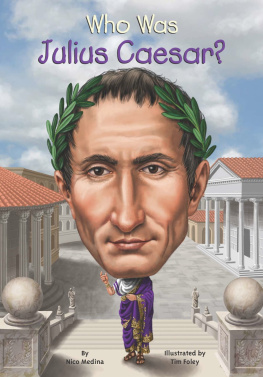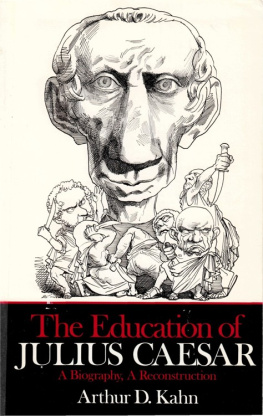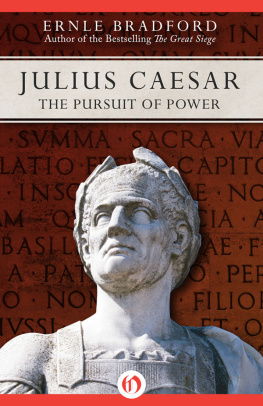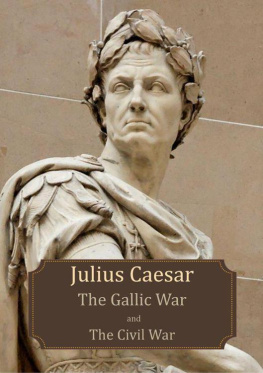Peter Stothard - The Last Assassin: The Hunt for the Killers of Julius Caesar
Here you can read online Peter Stothard - The Last Assassin: The Hunt for the Killers of Julius Caesar full text of the book (entire story) in english for free. Download pdf and epub, get meaning, cover and reviews about this ebook. year: 2020, publisher: Orion, genre: History. Description of the work, (preface) as well as reviews are available. Best literature library LitArk.com created for fans of good reading and offers a wide selection of genres:
Romance novel
Science fiction
Adventure
Detective
Science
History
Home and family
Prose
Art
Politics
Computer
Non-fiction
Religion
Business
Children
Humor
Choose a favorite category and find really read worthwhile books. Enjoy immersion in the world of imagination, feel the emotions of the characters or learn something new for yourself, make an fascinating discovery.
- Book:The Last Assassin: The Hunt for the Killers of Julius Caesar
- Author:
- Publisher:Orion
- Genre:
- Year:2020
- Rating:3 / 5
- Favourites:Add to favourites
- Your mark:
- 60
- 1
- 2
- 3
- 4
- 5
The Last Assassin: The Hunt for the Killers of Julius Caesar: summary, description and annotation
We offer to read an annotation, description, summary or preface (depends on what the author of the book "The Last Assassin: The Hunt for the Killers of Julius Caesar" wrote himself). If you haven't found the necessary information about the book — write in the comments, we will try to find it.
The Last Assassin: The Hunt for the Killers of Julius Caesar — read online for free the complete book (whole text) full work
Below is the text of the book, divided by pages. System saving the place of the last page read, allows you to conveniently read the book "The Last Assassin: The Hunt for the Killers of Julius Caesar" online for free, without having to search again every time where you left off. Put a bookmark, and you can go to the page where you finished reading at any time.
Font size:
Interval:
Bookmark:

To Ruth

CASSIUS PARMENSIS (c7530 BC): Poet, playwright, naval commander, longest surviving assassin of Julius Caesar. Epicurean. Executed in retirement in Athens.
GAIUS CASSIUS LONGINUS (c8642): Philosopher, politician, general, joint leader of the assassins. Husband of Marcus Brutuss sister. Epicurean. Committed suicide after first defeat at Philippi.
MARCUS BRUTUS (8542): Orator, politician, idealist, general, joint leader of the assassins. Son of Caesars mistress, Servilia. Committed suicide after second defeat at Philippi.
DECIMUS JUNIUS BRUTUS (c8343): General, military innovator, closest friend to Caesar among the assassins. Killed on orders of Mark Antony while in flight to join Brutus and Cassius.
GAIUS TREBONIUS (c9243): General for Caesar, editor and anthologist of Cicero. Tortured by Dolabella. First of the assassins to be killed.
PUBLIUS SERVILIUS CASCA (c8442): Senator, Peoples Tribune. Striker of the first blow in Caesars assassination.
TILLIUS CIMBER (c8042): Impetuous naval commander. Embittered by failed petition to Caesar on behalf of his exiled brother.
PONTIUS AQUILA (c8043): Independent-minded banker, soldier, aide to Decimus Brutus. Angered by the confiscation of his land for Caesars mistress, Servilia. Killed in battle against Mark Antony.
LUCIUS MINUCIUS BASILUS (c8043): Military aide to Caesar. Frustrated by lack of promotion. Killed by his slaves during the Proscriptions against the assassins.
QUINTUS LIGARIUS (c8043): Supporter of Pompey in the civil war against Caesar. Spared by Caesar after persuasion by Cicero. Hunted under the Lex Pedia.
SERVIUS SULPICIUS GALBA (c80c43): Officer for Caesar. Insulted by Caesars affair with his wife and a disputed debt. Hunted under the Lex Pedia.
PACUVIUS LABEO: (c8542): Lawyer close to Marcus Brutus. Committed suicide at Philippi.
DECIMUS TURULLIUS (c7531): Assassin and naval commander with Cassius Parmensis. Executed on Octavians orders in Cos after the battle of Actium.
MARCUS TULLIUS CICERO (10643): Orator, philosopher, politician. Sympathiser with the assassins. Enemy of Mark Antony. Executed on orders of Antony and Octavian.
SEXTUS POMPEIUS (6736): Younger son of Caesars last rival, Pompey the Great. Independent naval commander. Joined by Cassius Parmensis and defeated by Octavian in one of the great sea battles of antiquity.
QUINTUS HORATIUS FLACCUS, Horace (658): Poet. Supporter of Marcus Brutus. Fighter at Philippi. Subsequently crosses to the side of Octavian.
SERVILIA (c100c40): Mother of Marcus Brutus, lover of Caesar. Wealthy and influential operator in the assassins cause.
PORCIA (7043): Wife of Marcus Brutus and daughter of Caesars enemy, Cato. Powerful spur to the assassination.
CAIUS JULIUS CAESAR OCTAVIANUS, Octavian (63 BC14 AD): Adopted son and heir of Julius Caesar. Prime mover of the hunt for the assassins through the Lex Pedia and the terror of the Proscriptions. Future Emperor Augustus.
MARCUS ANTONIUS, Mark Antony (8330): Heir to Caesars cause until the arrival of Octavian. Initial negotiator with Cicero of an amnesty for the assassins. Drawn by Octavian down a competitive course of vengeance.
MARCUS AEMILIUS LEPIDUS (c89c13): General for Caesar, aristocrat. Third member of the Triumvirate that avenged Caesars death. Removed before the final confrontation between Octavian and Mark Antony.
LUCIUS ANTONIUS (c75c39): Brutal younger brother of Mark Antony. Destroyer of Parma. Defeated by Octavian in the siege of Perusia.
PUBLIUS CORNELIUS DOLABELLA (6943): Dissolute street agitator for Caesar. Sometime son-in-law of Cicero.


Epicurus, detail from The School of Athens, Raphael (150911)
From a half-closed window the hills of Athens rose ragged against the haze. The fires down below belonged to those who had not been in the city long. The summer dawn was crackling with the sound of sometime soldiers and of cicadas and of birds awaking high amid pale-painted marble, the light crunch of lizards on leaves, a thin curtain of noise.
The night wind still blew out to sea, soon about to turn as the land warmed and the day winds began. The last thin scent of sulphur rolled off the Acropolis slopes.
Cassius Parmensis was in bed in a small house behind a boarded door. He was a sailor, poet and playwright and Athens was being good to him. For the last surviving assassin of Julius Caesar, a year after his last battle, this ever more crowded city was arguably the very best place of retirement. Every dawn was a surprise. Athenian dawns were some of the most perfumed and orange-pink. It was small wonder that so many people came here.
Parmensis, named for his familys home in Parma, near where Italy then met Gaul, had been one of the lesser wielders of the daggers on the Ides of March, one of the common herd of conspirators, not a Brutus, not the other more famous Cassius, those men who were dead and already entering history. While, like others in the conspiracy, Parmensis was a writer of history himself, his name was not yet a part of it.
In his early forties, he was old enough respectably to retire. But, at a time when Caesars angry heir ruled supreme, he could not return to Italy, not to Rome, not to his once fertile home between the Rubicon and Po rivers. In the streets below the Acropolis, Parmensis had new admirers, a few former brothers-in-arms, even some readers for his poems and plays.
Fourteen years after the assassination that had failed to change the world, Athens was still a favoured place for writers, for dissidents and theorists, for stubborn dreamers, recent veterans who wrote of battles lost and old soldiers who told them how they could have won. Through its past it offered a kind of asylum.
Words and swords still stood side by side in the battle to be remembered. Particularly towards the end of a mans life the writing of a poem might mean more than all the killings and failures to kill. A great last act might be more than just the end of a play. His new home suited well the remaining hopes of Cassius Parmensis.
Athens, like so many of its night-time visitors, was a city whose best years were behind it, a sheltered home for many other Romans like himself, men of the navy and the minor arts, educated citizens who, while they had not themselves been prepared (or asked) to thrust their daggers into Caesars corpse, preferred some sort of freedom to any sort of one-man rule. The best ideals of ancient Greece, however hazy, stood out brightly against what their own country had become.
Athenians were fickle. They might unite to fight Romans or divide and back one Roman side against another. That had long been their way. But every cultured man felt better in the city where the works of Homer were first put in writing, the city of Aeschylus, Euripides, Socrates and Plato. Parmensis himself followed the philosophy of Epicurus, famed for his Athenian garden, dead for more than two hundred years but influential in Athens and far beyond. The poet from Parma who became a sea captain never claimed originality. He did like to be consistent. He was thorough. That was what ships and poetry demanded.
Font size:
Interval:
Bookmark:
Similar books «The Last Assassin: The Hunt for the Killers of Julius Caesar»
Look at similar books to The Last Assassin: The Hunt for the Killers of Julius Caesar. We have selected literature similar in name and meaning in the hope of providing readers with more options to find new, interesting, not yet read works.
Discussion, reviews of the book The Last Assassin: The Hunt for the Killers of Julius Caesar and just readers' own opinions. Leave your comments, write what you think about the work, its meaning or the main characters. Specify what exactly you liked and what you didn't like, and why you think so.

